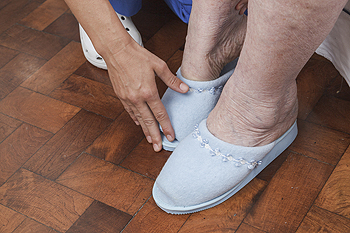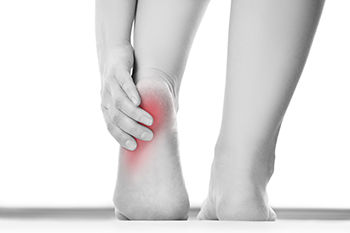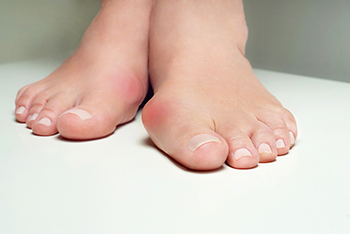

Football players are at high risk for ankle injuries due to the sport's physical demands, including rapid direction changes, running, and jumping. Sprains are one of the most common ankle injuries, particularly among running backs and receivers. These sprains often occur when the ankle is twisted or stepped on during play, causing damage to ligaments. High ankle sprains, which involve the ligaments above the ankle, are more severe and take longer to heal than lower ankle sprains. If not treated properly, ankle injuries can lead to long-term problems like chronic instability and pain. This may impact a player's performance and ability to participate in future games. A podiatrist can help by diagnosing the injury, recommending proper treatment, and suggesting ways to prevent future injuries through bracing or rehabilitation exercises. If you have an ankle injury as a result of playing football, it is suggested that you make an appointment with a podiatrist.
Sports related foot and ankle injuries require proper treatment before players can go back to their regular routines. For more information, contact Dr. Nooshin Zolfaghari of VIP Foot & Ankle Center. Our doctor can provide the care you need to keep you pain-free and on your feet.
Sports Related Foot and Ankle Injuries
Foot and ankle injuries are a common occurrence when it comes to athletes of any sport. While many athletes dismiss the initial aches and pains, the truth is that ignoring potential foot and ankle injuries can lead to serious problems. As athletes continue to place pressure and strain the area further, a mild injury can turn into something as serious as a rupture and may lead to a permanent disability. There are many factors that contribute to sports related foot and ankle injuries, which include failure to warm up properly, not providing support or wearing bad footwear. Common injuries and conditions athletes face, including:
Sports related injuries are commonly treated using the RICE method. This includes rest, applying ice to the injured area, compression and elevating the ankle. More serious sprains and injuries may require surgery, which could include arthroscopic and reconstructive surgery. Rehabilitation and therapy may also be required in order to get any recovering athlete to become fully functional again. Any unusual aches and pains an athlete sustains must be evaluated by a licensed, reputable medical professional.
If you have any questions please feel free to contact our office located in Pembroke Pines, FL . We offer the newest diagnostic and treatment technologies for all your foot and ankle needs.

Elderly people frequently encounter foot problems, such as plantar fasciitis, arthritis, gout, and claw toe. Plantar fasciitis, marked by heel pain and inflammation of the tissue along the bottom of the foot, can be particularly bothersome. Arthritis, including osteoarthritis and rheumatoid arthritis, often leads to joint pain, stiffness, and swelling, impacting overall mobility. Gout, another type of arthritis characterized by sudden, intense pain and swelling, usually affects the big toe due to uric acid crystal buildup. Additionally, claw toe, a condition where toes bend into a claw-like position, can result from muscle imbalances or arthritis. If you are older and are experiencing specific foot conditions, it is suggested that you make an appointment with a podiatrist who can provide you with relief and treatment solutions.
Proper foot care is something many older adults forget to consider. If you have any concerns about your feet and ankles, contact Dr. Nooshin Zolfaghari from VIP Foot & Ankle Center. Our doctor can provide the care you need to keep you pain-free and on your feet.
The Elderly and Their Feet
As we age we start to notice many changes in our body, but the elder population may not notice them right away. Medical conditions may prevent the elderly to take notice of their foot health right away. Poor vision is a lead contributor to not taking action for the elderly.
Common Conditions
Susceptible Infections
Diabetes and poor circulation can cause general loss of sensitivity over the years, turning a simple cut into a serious issue.
If you have any questions please feel free to contact our office located in Pembroke Pines, FL . We offer the newest diagnostic and treatment technologies for all your foot and ankle needs.

Heel pain can arise from a variety of causes, most often related to overuse, wearing improper footwear, or structural issues in the foot. Plantar fasciitis, which involves inflammation of the thick band of tissue that connects the heel bone to the toes, is the most frequent cause. Other possible causes of heel pain include Achilles tendonitis, stress fractures, or nerve entrapment like tarsal tunnel syndrome. Systemic conditions, such as arthritis or diabetes, can also contribute to heel pain, especially in older adults or those who are overweight. Regardless of the underlying cause, a podiatrist can diagnose the condition through a physical examination and imaging tests. Treatment options may include practicing specific exercises, custom orthotics, or in some cases surgery. If you have persistent or worsening heel pain, it is suggested that you schedule an appointment with a podiatrist to determine the cause and recommend appropriate treatment.
Many people suffer from bouts of heel pain. For more information, contact Dr. Nooshin Zolfaghari of VIP Foot & Ankle Center. Our doctor can provide the care you need to keep you pain-free and on your feet.
Causes of Heel Pain
Heel pain is often associated with plantar fasciitis. The plantar fascia is a band of tissues that extends along the bottom of the foot. A rip or tear in this ligament can cause inflammation of the tissue.
Achilles tendonitis is another cause of heel pain. Inflammation of the Achilles tendon will cause pain from fractures and muscle tearing. Lack of flexibility is also another symptom.
Heel spurs are another cause of pain. When the tissues of the plantar fascia undergo a great deal of stress, it can lead to ligament separation from the heel bone, causing heel spurs.
Why Might Heel Pain Occur?
Treatments
Heel pain should be treated as soon as possible for immediate results. Keeping your feet in a stress-free environment will help. If you suffer from Achilles tendonitis or plantar fasciitis, applying ice will reduce the swelling. Stretching before an exercise like running will help the muscles. Using all these tips will help make heel pain a condition of the past.
If you have any questions please contact our office located in Pembroke Pines, FL . We offer the newest diagnostic and treatment technologies for all your foot and ankle needs.

Bunions are bony bumps that form at the base of the big toe, often caused by a misalignment of the toe joint. This condition leads to the big toe angling toward the other toes, creating an uncomfortable and noticeable protrusion. Common symptoms include pain, swelling, and difficulty wearing certain shoes. Bunions can result from genetic factors, excessive foot stress, or wearing ill-fitting shoes. Treatment for bunions focuses on managing pain and slowing progression. Initially, this involves wearing properly fitting shoes with a wide toe box and using orthotic inserts to reduce pressure. Taking anti-inflammatory medications can help with discomfort. In more severe cases, where conservative measures fail, surgical options may be considered to realign the toe and correct the deformity. If you're experiencing symptoms of a bunion or need advice on managing foot discomfort, it is suggested you make an appointment with a podiatrist who can provide expert care and tailor treatment to your specific needs.
If you are suffering from bunions, contact Dr. Nooshin Zolfaghari of VIP Foot & Ankle Center. Our doctor can provide the care you need to keep you pain-free and on your feet.
What Is a Bunion?
A bunion is formed of swollen tissue or an enlargement of boney growth, usually located at the base joint of the toe that connects to the foot. The swelling occurs due to the bones in the big toe shifting inward, which impacts the other toes of the foot. This causes the area around the base of the big toe to become inflamed and painful.
Why Do Bunions Form?
Genetics – Susceptibility to bunions are often hereditary
Stress on the feet – Poorly fitted and uncomfortable footwear that places stress on feet, such as heels, can worsen existing bunions
How Are Bunions Diagnosed?
Doctors often perform two tests – blood tests and x-rays – when trying to diagnose bunions, especially in the early stages of development. Blood tests help determine if the foot pain is being caused by something else, such as arthritis, while x-rays provide a clear picture of your bone structure to your doctor.
How Are Bunions Treated?
If you have any questions, please feel free to contact our office located in Pembroke Pines, FL . We offer the newest diagnostic and treatment technologies for all your foot care needs.